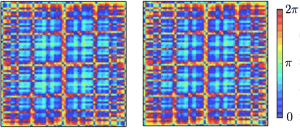Summary
An important challenge in building a quantum computer is quantifying the level of control obtained in the preparation of a quantum state. The state of a quantum device is characterized from experimental measurements, using a procedure known as tomography. Exact tomography requires a vast amount of computer resources, making it prohibitive for quantum devices larger than a few qubits. In this project we develop a practical, approximate tomography method using modern machine learning techniques. Our work is based on training artificial neural networks using measurement data obtained from a system of qubits. After training, the neural network is sampled to determine properties of the underlying quantum state. As part of a collaborative effort, we will demonstrate our machine learning algorithms on both synthetic and experimental measurement data. Our ultimate goal is to deliver practical machine learning technology to design and characterize near-term quantum devices.

Figure 1. A visualization of the phases of a quantum wavefunction of 100 qubits. At left, the exact value of the phases, obtained from a large-scale computer simulation. At right, the phases reconstructed with state tomography using artificial neural networks.
Related Content

Scanning Tunneling Microscopy of Quantum Materials, Devices and Molecules
Summary This project advances our ability to characterize and study novel quantum materials, quantum devices, and even individual molecules at the atomic level. By combining Non-Contact Atomic Force Microscopy (NC-AFM), Scanning Tunneling Microscopy (STM) and scanning gate methods, we correlate spatial information with transport properties and can locally manipulate charge, spin and structural states. […]
January 28, 2019

Quantum Sensing with Small Quantum Systems
Summary There are small quantum systems over which we have very good control and which have long lifetimes. Examples include the phosphorous (P) defect in silicon (Si) and the nitrogen vacancy (NV) defect in diamond. With P defect in Si, we focus on improving our understanding of the hyperpolarization mechanism to better enable engineering of […]
December 1, 2016

Plasmon Control of Quantum States in Semiconductor Nanocrystals
Summary Thanks to the light-induced collective oscillations of free charges at the boundary between a conducting material and a dielectric, known as surface plasmon resonance, metallic nanostructures can exhibit strong light absorption and scattering. The sensitivity of these resonances to the local environment and shape of the metallic structures allows them to be used, […]
March 21, 2018

Quantum Dynamics of Cavity Interactions with Spin Ensembles
Summary High quality factor cavities can be powerful control elements for ensembles of spins, enabling unitary control as well as on demand cooling. They can also be used to couple two otherwise non-interacting ensembles. The goal of the project is to explore the physics and engineering of such systems both theoretically and experimentally. The laboratory contains a […]
September 7, 2016

